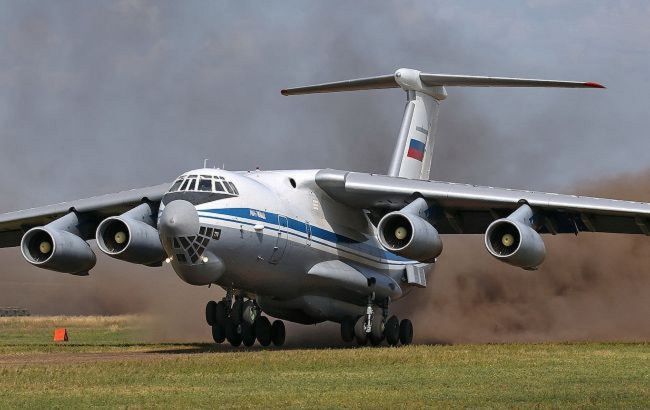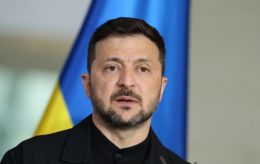Destruction of Aircraft in Pskov - ISW analyzes successful drone attack
 During the attack on the Pskov airfield, four Il-76 aircraft were destroyed (photo: Russian media)
During the attack on the Pskov airfield, four Il-76 aircraft were destroyed (photo: Russian media)
During a large-scale drone attack last night reported in various regions of Russia, air defense forces were unable to shoot down the UAVs that destroyed several military transport Il-76 aircraft at the "Pskov" airfield. These drones went unnoticed, likely due to the concentration of Russian air defense forces on the defense of their capital. These conclusions were reached by analysts at the Institute for the Study of War in their report.
Ukrainian forces destroyed four Russian Il-76 aircraft during a drone strike on a Russian airfield in the Pskov region on the night of August 29-30.
Andrii Yusov, a representative of the Main Intelligence Directorate of the Ministry of Defense of Ukraine (GUR MOU), stated that as a result of the UAV strike, 4 Russian Il-76 aircraft were destroyed, and possibly 2 more aircraft were damaged at the Pskov airfield. However, no comments were made about the nature of the strike, and no one claimed responsibility for it.
Geolocated footage and Russian sources have confirmed the strike and the destruction of at least two Russian Il-76 aircraft.
Russian "war correspondents" claim that over 21 Ukrainian drones carried out an attack on the Pskov airfield.
Russian sources, including those within the Russian Ministry of Defense, claimed that air defense and electronic warfare systems also shot down drones over the Oryol, Tula, Voronezh, Ryazan, Kaluga, Bryansk, and Moscow regions.
The Mayor of Moscow, Sergey Sobyanin, stated that Russian air defenses repelled a mass drone strike by Ukrainian UAVs over the Central Federal District (a large administrative district that includes Moscow but not Pskov). He also mentioned that at least one UAV was headed toward Moscow, possibly suggesting that Russian authorities initially believed that the Ukrainian Armed Forces were intending to strike Moscow or the surrounding region.
Experts believe that Russian forces may have concentrated their air defenses on protecting Moscow and "somehow failed to notice an unusually large number of Ukrainian drones, which reportedly struck the Pskov airfield."
The report also mentions that drones shot down by Russian air defense systems over six other regions were likely headed towards Moscow or the Pskov region and probably were not part of Ukraine's efforts to target locations in other Russian regions.
Russian propagandists and "war correspondents" criticized Russian forces for their inability to defend Russian territory and military facilities, while simultaneously criticizing recent censorship efforts by the Russian Ministry of Defense. A Kremlin-affiliated Russian military blogger stated that the Ukrainian strike on the Pskov airfield indicates that Russian air defenses have not adapted to defend against repeated Ukrainian drone strikes, unlike how Russian air defenses adapted in occupied Crimea.
The "war correspondent" also criticized the Russian government for not keeping expensive military aircraft in hangars.
Another well-known Russian military blogger expressed concern that there will be no safe places in Western Russia due to the growing technical capabilities of Ukraine and suggested that Russian forces should take this into account when ensuring the security of military and strategic facilities.
However, another "war correspondent" noted that the Russian government's demands for security and protection of airfields are on a "qualitatively different level" compared to what it was previously.
Russian sources also questioned recent efforts by the Russian Ministry of Defense regarding censorship, emphasizing the need for truth and honesty in reporting alleged Ukrainian strikes on Russian territory, including one Russian "war correspondent" who criticized official Russian TV channels for not reporting on Ukrainian strikes.
Prominent Kremlin propagandist Vladimir Solovyov expressed his outrage in response to the drone strike and criticized the Russian elite calling on the Kremlin to "freeze" the war against Ukraine and engage in negotiations to save the Russian economy.
Key findings:
-
On the night of August 30, Russian forces launched a large-scale missile and drone strike primarily targeting Kyiv, possibly in response to previous UAV attacks on Russian Moscow and Pskov regions.
-
As of August 30, Ukrainian light infantry (likely reconnaissance units) had infiltrated to the east of Russian field fortifications near Verbove.
-
It is reported that the Kremlin has made efforts to silence or discredit reports about the funeral of the PMC (Private Military Company) "Wagner" leader, Yevgeny Prigozhin, which likely indicates that the Kremlin is still concerned about Prigozhin's appeal in Russia and among "Wagner" fighters, even after his death.
-
Some Russian officials may be investigating the opinions of "war correspondents" about Prigozhin and his death to identify and censor Russian ultranationalists who are not directly associated with Prigozhin or the PMC "Wagner."
-
On August 30, the head of Chechnya, Ramzan Kadyrov, reaffirmed his loyalty to the Russian dictator, Vladimir Putin, continuing his efforts to distance himself from the leader of PMC "Wagner," Yevgeny Prigozhin.
-
Russian forces conducted offensive operations on August 30 along the Kupiansk-Svatove-Kreminna line, in the Bakhmut direction, along the Avdiivka-Donetsk line, in the border area between Donetsk and Zaporizhzhia regions, and in the western part of Zaporizhzhia region. It is reported that they made advancements in these areas.
-
On August 30, the Ukrainian Armed Forces conducted offensive operations on at least two sections of the front, making advancements in the Bakhmut region, in the border area between Donetsk and Zaporizhzhia regions, and in the western part of Zaporizhzhia region.
-
It is reported that the Russian Ministry of Defense prohibited mercenaries from the PMC "Wagner" from participating in hostilities in Ukraine.
-
Additionally, the Ukrainian Crimean partisan group "Atesh" claimed that its partisans successfully detonated an explosive device in the campaign headquarters of the "Yedyna Russia" party in the occupied Nova Kakhovka, Kherson region, on August 29.
Drone strikes on the Pskov airport
On the night of August 30, Ukraine carried out drone attacks on six regions of Russia. One of the targets was the Pskov airport, where, according to the representative of the Main Directorate of Intelligence of the Ministry of Defense of Ukraine, Andrii Yusov, four Il-76 aircraft were destroyed. Several other planes were damaged.
According to RBC-Ukraine, the operation was reportedly organized by the Main Directorate of Intelligence of the Ministry of Defense of Ukraine. However, official comments on their involvement or lack thereof from the intelligence have not been provided yet.
Additionally, satellite imagery showcasing the aftermath of the drone attack on the airport near Pskov in Russia has already emerged.

